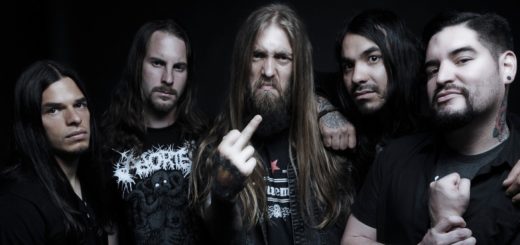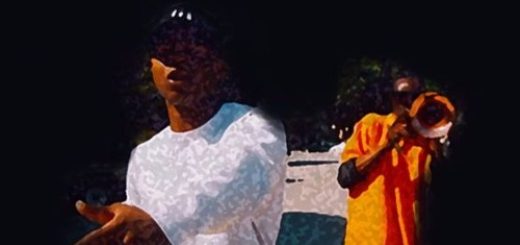Getting Back to Our Roots with Tijuana Panthers and Santoros
Crossfader recently had the pleasure of chatting with some of the bands of La Batalla Festival at The Glass House Pomona. The festival, aside from serving as an authentically cultural Cinco de Mayo celebration, is all about showcasing effervescent, scrappy, and above all downright talented bands and artists from the LA area.
We first sat down with Santoros, a Mexican-American seven-piece psychedelic folk group that also helped create the festival. Their latest release, last year’s EL PERDEDOR, is a thoughtful, care-free, and ecstatic romp expressed through jangly guitar riffs and playful vocals. The album also marked the group’s first foray into singing in their native Spanish as Santoros. We chatted about the importance of heritage in their music, the frequently intimidating scope of the LA music scene, and the greater cultural meaning behind La Batalla Festival.
Hi, guys! How have things changed for Santoros since your last release, 2014’s ANIMALS EP?
I think the sound matured a lot. Before, it was exclusively fast-paced music, but we’ve got some slow ones on the new album. We also sing in Spanish on some tracks for the first time as a band.
Was singing in Spanish an important step for the band?
It was, but it’s also just natural for us as native speakers. Having songs in Spanish also helps let people know who we are. We weren’t actively trying to make Spanish songs, it just comes out; it’s just who we are.
What are some of your main influences as a band?
Mexican music, Harry Nilsson, American rock and roll, but we all have different interests. We also take a lot of influence from being from LA, where we come from.
You guys helped create this festival, La Batalla, which translates to “The Battle” in Spanish. What was the meaning behind that?
It references La Batalla de Puebla or The Battle of Puebla from 1862. The French were trying to take land from the Mexican people. The Mexicans were like, “What the fuck? They are kicking us out of here!” So the Mexicans got people together to fight for their land, some even without proper weapons. If that didn’t happen, it would have been a disaster for us. So we named the festival [La Batalla] in honor of the battle, as well as a Cinco de Mayo celebration. We wanted to use this as an opportunity to educate some Americans about that historical event, since some people just go out, have fun, and get drunk without knowing why Cinco de Mayo even exists.
What was your process behind curating the festival’s lineup?
We pretty much just hit up our friends like Adult Books, Billy Changer, Colleen Green, Tijuana Panthers . . . Also people in [a] similar music scene, like from Lolipop and Burger Records.
Aside from friendships and label similarities, is there a thematic or ideological through line that connects the bands in the lineup?
Besides being LA-based, they share a similar struggle to us of being in an environment that’s so full of good bands and talent, that it can be easy to get overlooked. On any given Sunday you can go to 20 shows in LA and every band is gonna be great. LA is a blessing and a curse.
What’s next for Santoros?
We have a west coast tour coming up and then a vinyl release party at The Echo on July 21st. We’re still putting together the lineup, but it should be fucking cool. After that we’re gonna release four tracks for an EP on 7”.
Sounds great. Best of luck to you guys!
Last, but certainly not least, we chatted with the headlining band of the festival, Tijuana Panthers. The Long Beach surf punk trio’s latest release, 2016’s GHOST FOOD, continued the group’s consistent track record of crafting infectious, bouncy, sun-bleached tunes that stand toe-to-toe with contemporaries like Ty Segall or Thee Oh Sees. We were able to talk with drummer Phil Shaheen (P) and guitarist Chad Wachtel (C) about their love of Long Beach, being a pushover, and their own brand of “wussy pop.”
Hello, Tijuana Panthers! How has the touring and reception been since GHOST FOOD came out?
P: It’s been good. We just did a tour with Tiger Army and it seemed to go pretty well, right?
C: Yeah, selling a lot of tapes.
P: Yeah, it was only physically released on cassette tape. It’s really weird that every time we put out a record it seems like it takes a year for our fans to figure out we put out a record.
What are some of your main influences as a band? Is Long Beach or the LA scene included?
P: TSOL and a lot of the bands from the ‘80s in Long Beach. Fender’s and Bogart’s were places that a lot of punk bands came through. There’s also Suburban Lawns and Le Shock, who are both from Long Beach, but we don’t sound anything like them.
C: For me, it’s just growing up and listening to oldies radio or old surf tunes. Buddy Holly tapes, Little Richard, stuff like that. Then it fused with ‘80s stuff, like the new wave I used to listen to in my older sister’s Volkswagen when we would cruise around when I was a kid.
P: Growing up [and] going to thrift stores was part of it too, which was normal for us in Long Beach. We would go down to Orange County sometimes and surf, but we would always get out of there quick because the culture was just way different than what we grew up with. LA was weird too, and just not a place I ever wanted to go, so Long Beach was kind of the safe spot, since it was where we were from. For anyone, they pull from where they grew up.
Do you guys abide by a specific genre label?
P: Surf punk.
C: I just tell people that we’re wussy pop, like The Beach Boys.
P: And then everyone says, “No, it doesn’t sound like that.” [Laughs]
C: I think they’re wrong, but it’s ok.
Does Tijuana Panthers have a band motto or ethos?
P: Not really. We keep it pretty mellow. We’re not gonna put on a costume or anything.
C: We’re wimps. Keep it mellow, man.
P: Yeah I think just being a pushover is kind of our motto.
C: In terms of a motto for writing, I personally can’t really write anything that’s completely contrived. Everything I’ve ever written comes from personal experience. Not that there’s anything wrong with writing from a fictional perspective, I just can’t do it.
What’s next for Tijuana Panthers?
P: We’ve gone to Europe the past three summers, so this year we’ll be home playing a bunch of shows around California, mainly. We’ll get to surf and play the shows later that night, which is nice. Working on a new record too. Well, working on working on a new record, let’s say that.
Would you consider the surf rock scene more of a supportive community or more of everyone doing their own thing?
P: I think it’s supportive, but we haven’t really dealt with it too much. We end up playing with all different types of bands, but I’m sure there is a scene that’s very supportive. It seems like the whole Burger Records scene is like that. We’ve never really been in a scene. We play the music then go home. [Laughs] I’ve been married for 13 years and I stopped going to shows a long time ago. [Laughs]
C: I was married for a little bit. Still keeping it mellow, though, out of marriage. Maybe have a beer or two.
P: We listen to a lot of talk radio and go surfing, so there’s not a lot of after party with us.



